-
This article talks
about what options do men have in handloom clothing, especially during the
festive season.
People often
associate handlooms with sarees. It is a misconception that handloom clothing
is only for women, or different craft clusters across Indian only weave sarees.
That is not true at all. Any handloom or weaving setup weaves a textile, and
that textile can take any form - be it a saree, dupatta, stole, scarf, dhoti or
sarong.
Most handloom
clusters across India produce fabrics, which can then be stitched into any
garment of your liking - be it for a man or woman.
Actually Indian
textiles are very versatile. Any garment can be made out of any and every
textile. So then why do we restrict handlooms only to sarees? The more we wear
it and promote it, the more we take this heritage of ours forward.
This article is dedicated to some specific handloom fabrics that are suitable for men’s garments. I do not wish to put any labels, boxes or categorise/restrict you in any way. The intent to introduce you to the wonderful world of Indian handlooms. Read on.
1. Pochampally Ikat
Ikat, across various Indonesian languages, means ‘to bind or tie’.
It is a resist
dyeing technique (another form of tie-dye) wherein beautiful geometric patterns
are created on fabric by binding the yarns together as per the desired design.
Once the dyeing of yarns is done, they are then put on the handloom and woven
into fabrics or textiles.
Pochampally Ikat
in India is produced primarily in the eponymous Pochampally village, Telangana.
Ikat is an
incredibly versatile, gender fluid fabric, made in both pure silk & cotton.
The patterns in Pochampally Ikat are essentially geometric in nature i.e. triangle, rhombus, kite, squares etc. Ikat fabrics are perfect for men’s kurtas, shirts, bundis or Nehru jackets and even ties & pocket squares. The pictures below will give you a better idea.
Online shopping avenues
Ready-to-wear - ajio.com, fabindia.com,
vinegr.in, indigharana.com, jaypore.com
Fabrics - itokri.com, gocoop.com.
You can buy
ready-to-wear directly or buy fabrics and then get it stitched. Normally, for a
kurta, jacket or shirt, 2.5 metres of fabric is sufficient.
 Cotton Ikat shirt from vinegr.in &
kurta from fabindia.com
Cotton Ikat shirt from vinegr.in &
kurta from fabindia.com
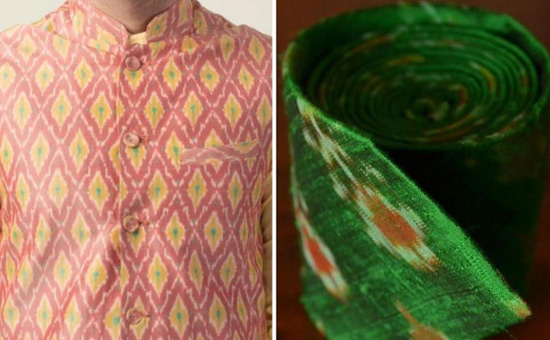 Silk Nehru jacket from fabindia.com. Tie from indigharana.com
Silk Nehru jacket from fabindia.com. Tie from indigharana.com
2. Handblock
prints
India is home to a
number of handblock printing crafts like Ajrakh, Dabu, Bagru, Bagh, Kalamkari
and Sanganeri etc.
A Nehru jacket or bundi in one of these block prints with a plain silk or cotton kurta would look absolutely stately for the festive season. A block printed kurta would also look amazing if you don’t mind the floral designs.
Block printing is
done on both handloom, non-handloom fabric bases in both cotton and silk.
Ideally, if you are wearing a cotton kurta, then go for a silk block-printed
jacket, and vice-versa.
Online shopping avenues
To buy
fabrics
(and then get a kurta/jacket stitched), visit itokri.com, fabriclore.com,
gocoop.com or matkatus.com and simply look for one of the aforementioned block
prints and choose the one you like.
For ready-to-wear, you can visit
fabindia.com. gocoop.com or ajio.com.
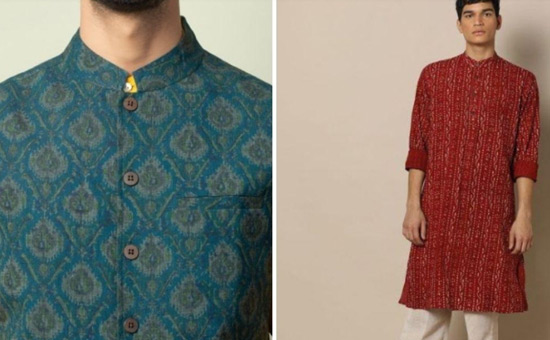 Handblock printed Nehru jacket from FabIndia and kurta from Ajio.
Handblock printed Nehru jacket from FabIndia and kurta from Ajio.
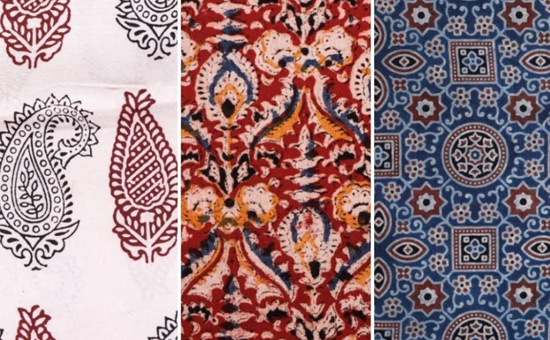 Handblock printed Bagh, Kalamkari & Ajrakh fabrics from itokri.com.
Handblock printed Bagh, Kalamkari & Ajrakh fabrics from itokri.com.
3. Odisha
Ikats
Just like
Telangana, Odisha also boasts many varieties of Ikats, namely, Sambalpuri,
Pasapalli, Nuapatna etc. Each of these textiles are named after the
geographical location they originated from or are woven in.
The key difference
between Odisha and Telangana Ikat is the intricacy of design.
Odisha Ikats are
way finer, more intricate than Telangana Ikats. Hence, the making is also more
complex and requires greater precision.
The patterns/designs in Odisha Ikats are also more diverse than its southern counterpart. Apart from geometric motifs, Odisha Ikats also feature wildlife (elephant, peacock, parrot, deer, fish etc.), tribal human figures, designs derived from Odisha’s ancient architecture (the Konark wheel for example), floral designs and what not! Basically everything that the Odisha region stands for and represents.
The Pasapalli fabric is another classical beauty from Odisha. ‘Pasa’ here refers to the ancient gambling game played using chess boards during the Mahabharata. Hence, the design of this fabric looks like a checkerboard.
Odisha Ikats would
make excellent jackets, waistcoats and bundis.
Online shopping avenues
For
fabrics
- utkalmitra.com, odishahandloom on Instagram, Tariniofficial on Instagram,
Itokri, Gocoop etc.
For
ready-to-wear
kurtas & jackets, you can visit Utkalmitra, Tarini or Sakshi handloom.
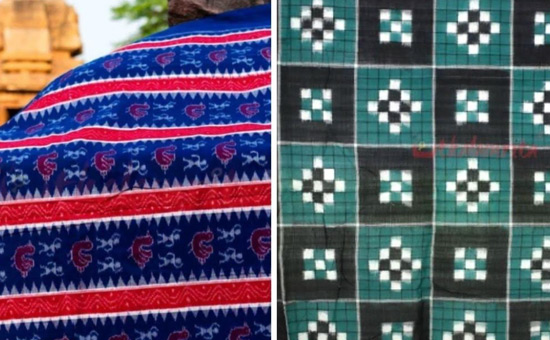 Tribal Silk Sambalpuri fabric & Pasapalli from
Utkalmitra.com.
Tribal Silk Sambalpuri fabric & Pasapalli from
Utkalmitra.com.
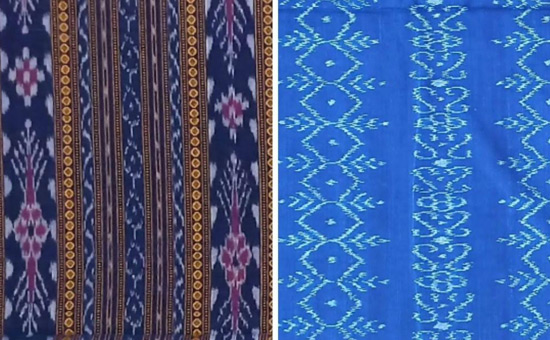 The other two Sambalpuris are from Gocoop.com
The other two Sambalpuris are from Gocoop.com
4. Dhotis
from Bengal, Odisha and Southern India
Here I would like
to introduce a lesser known handloom dhoti from Odisha called Berhampuri dhoti
woven in silk and cotton.
A typical
Berhampuri dhoti employs tie-dye weaving technique and has a combination of
Rudraksh, Muktapunji or Karela & temple border. Berhampuris are of the
oldest and classical textiles from Odisha. It is like an heirloom that you can
pass on to your young ones.
Next is Salem
cotton dhoti from Tamil Nadu.
These are
white/off-white (traditionally, but now different colours are available) pure
cotton dhotis with ornate gold borders along the edge. The motifs used in
borders are elephants, peacocks, swans, flowers, vines, kairi etc. These dhotis
are perfect for festive occasions.
Apart from these
two, you can also go for traditional Bengali dhutis from dheu.com or contact
sellers on Instagram. You can find plenty.
Where to buy
For Berhampuris, please reach out to Odishahandloom on Instagram or visit
saksihandloom.com.
Salem dhotis can be bought from Cooptex’s retail outlets or their online store.
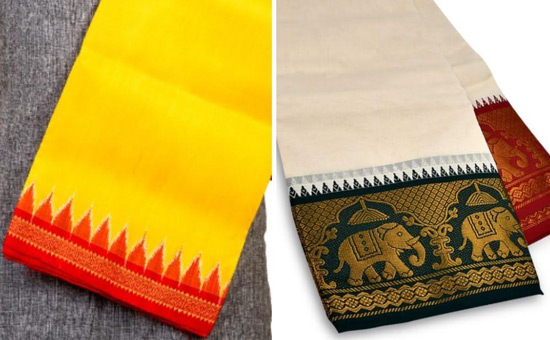 Silk Berhampuri dhoti from
sakshihandloom.com & Salem dhoti from chakrayog.com.
Silk Berhampuri dhoti from
sakshihandloom.com & Salem dhoti from chakrayog.com.
5. Maheshwari,
Mangalgiri & Chanderi
Most people think that Maheshwari, Mangalgiri and Chanderi are only for women as the most sought after products from these handloom clusters are sarees and suit pieces. But that’s not true. Beautiful, unisex zari fabrics are also woven in the three clusters.
Pure cotton, pure silk, and silk by cotton - three major varieties are available in terms of the fabric base. Most festive fabrics have small, fine zari borders. You can make very comfortable festive kurtas out of these fabrics. Use the zari around the neck and cuffs in your kurta, or simple cut it off if you don’t like it.
Online shopping avenues
For
fabrics - itokri.com, gaatha.com, gocoop.com, matkatus.com, REHWA Society for Maheshwaris, DAMA or DARAM (Dastkar Andhra Marketing Association) for Mangalgiris are some trustworthy brands to buy from.
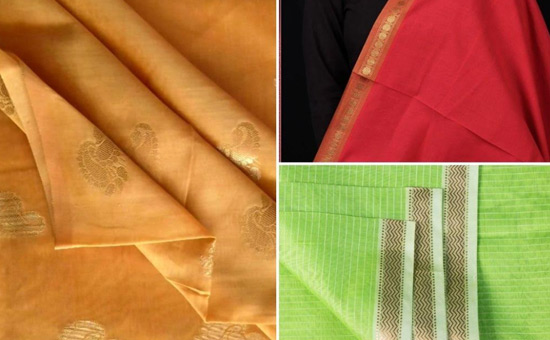 Chanderi fabric from Gocoop.com, Maheshwari &
Mangalgiri fabric from Itokri.com.
Chanderi fabric from Gocoop.com, Maheshwari &
Mangalgiri fabric from Itokri.com.
6. Khun
fabrics
Khun weaving is a
shared heritage between Maharashtra and North Karnataka.
Traditionally, this fabric was used to make women’s blouses. But with changing times and demands, Khun weaving diversified into sarees and even yardages.
Khun fabric
typically has a zari border and dark hues in the body in dhoop-chaon layout. The
motifs run across the body of the fabric, forming different patterns, and are
geometric in nature.
According to me,
Khun fabrics will make excellent Nehru jackets and can be paired with
off-white, cream kurta-pyjama sets.
You can shop Khun fabrics online from itokri.com.
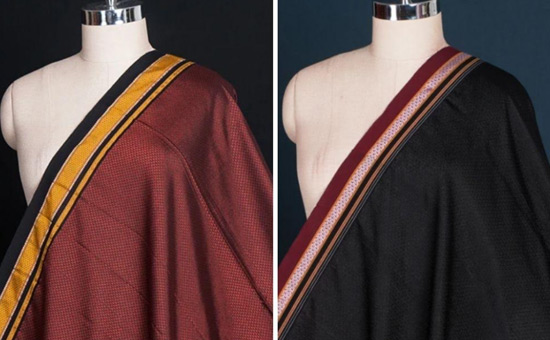 Traditional Khun fabrics from Itokri.com
Traditional Khun fabrics from Itokri.com
7. Jamdani
fabrics from Andhra Pradesh
Apart from Bengal,
Andhra Pradesh is also known for its Khadi and Muslin Jamdani textiles.
These fabrics are
woven in Srikakulam and Godavari districts of Andhra Pradesh using extra-weft
Jamdani technique. The base of the fabric is either handspun, handwoven Khadi
or fine Muslin, and the geometrical buttas are created by inserting extra-weft
yarns on the loom, just like embroidery.
These fabrics are
extremely light, comfortable and elegant. You can make festive as well as
regular wear long kurtas out of these.
To shop Jamdani fabrics, please visit
gocoop.com or chitrika.in.
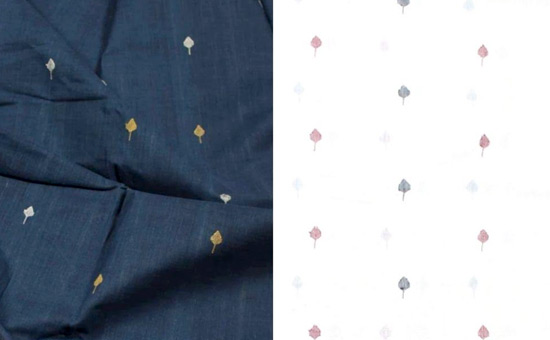 Muslin Jamdani fabrics from Gocoop.com
Muslin Jamdani fabrics from Gocoop.com
8. Handloom stoles
Stoles can make
any garb look interesting. If you are willing to go beyond the bare minimum
with an outfit, then consider wearing a stole as a cherry on the cake.
Mangalgiri or
Maheshwari stoles are simple, elegant and affordable. Next you have Kala cotton
& Bhujodi stoles from Kutch, Gujarat. Handloom linen or Ikat stoles also
look great!
To browse different types of interesting stoles, please visit
ajio.com, fabIndia.com, gocoop or itokri.com.
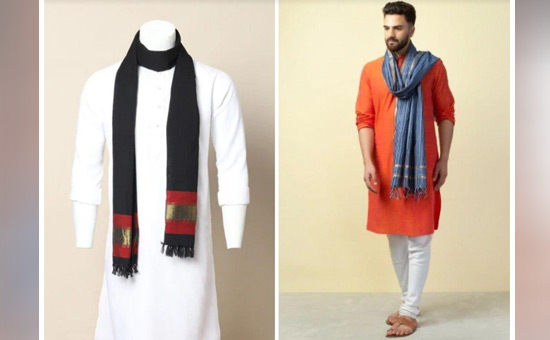 Kutchchi cotton stole from ajio.com &
silk stole from FabIndia.
Kutchchi cotton stole from ajio.com &
silk stole from FabIndia.
9. Solid
and plain silk fabrics for kurta-pyjama sets
Tussar & Kosa silk
Tussar and Kosa
are types of textured wild silk cultivated largely in parts of Odisha,
Jharkhand, Bihar, Chattisgarh and Maharashtra (Vidarbha region).
Most widely known
varieties are Gopalpur Tussar from Odisha, Bhagalpur Tussar from Bihar,
Vidarbha Tussar from Maharashtra and Chattisgarhi Kosa.
Tussar in its
natural form is undyeable, having a creamish colour. But now-a-days different
varieties of Tussar fabrics are available wherein some other types of yarns are
added to make Tussar silk more dyeable & wearable. Tussar and Kosa are
slightly coarse and thick in texture and feel, and thus perfect for winter
festivities.
Eri
silk & Muga silk
Northeastern India,
particularly Assam is renowned for producing the finest quality of Eri and Muga
silk.
Eri silk is fine, coarse and dense. It is spun, just like wool and hence has a different texture than normal silk fabrics. It is not as lustrous as, let’s say, Mulberry silk because it is a short staple fibre. The beauty of Eri silk relies on its numerous, beautiful textures.
Muga silk is
another beauty from Assam. In its natural form, Muga has a lustrous golden
colour. The textile is extremely sacred to the people of Assam. They adorn
clothing made of Muga silk on all holy occasions, and festivities.
To shop these fabrics, you must visit www.antaranartisanconnect.in
- a Tata trust initiative working directly with weavers of Assam and Odisha.
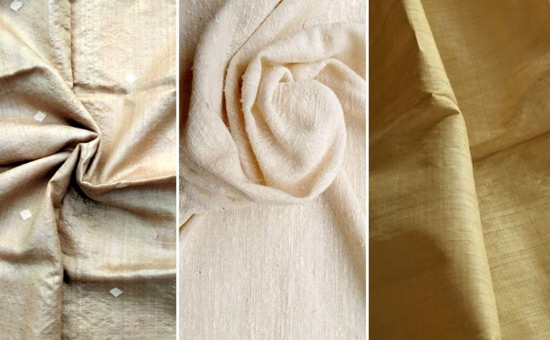 Tussar, Eri & Muga silk fabric from antaranartisanconnect.in
Tussar, Eri & Muga silk fabric from antaranartisanconnect.in
10. Other
well-known fabric/ready-to-wear options
|
Textile
|
Online Shopping
Avenues
|
|
1. Chikankari
embroidery
|
Ada Chikan,
Nazrana Chikan, Lucknowi Andaaz, Meiraas Official, FabIndia,
|
|
2. Handspun,
handwoven Khadi
|
Khadi India
(KVIC), iWearKhadi, KhadiGi, Gocoop.
|
|
3. Handloom
Linen
|
Gocoop, Itokri
|
|
4. Handloom
South Cotton
|
Gocoop, Itokri,
Matkatus, Chitrika
|
|
5. Handloom Silk
(Mulberry)
|
Gocoop, Itokri,
Matkatus
|
|
6. Benarsi
Brocades
|
Ekaya Benaras,
Gocoop, FabIndia, Itokri
|
|
7. Jacquard
fabrics
|
Itokri,
Fabriclore
|
Friends, please
note that these are just recommendations. You can buy anything you like, and
make any garment that is not mentioned in this article. Hope the information
provided is helpful!
Have a happy and
safe festive season ahead!
To read all articles
by author
Also read
1. Handloom
Saris
2. All articles on Traditional Indian Textiles
Credits for pics are given in captions for eg cover pic is thehindu.com Every attempt made to give credits, in case of any errors they are inadvertent. Please let us know errors if any and we shall correct.